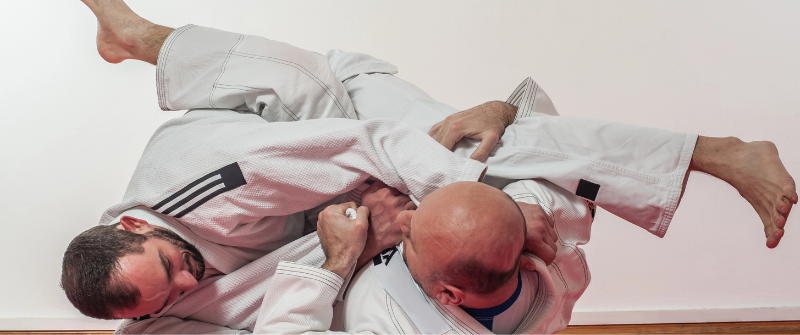
- by NEXO Team
- May 24, 2024
Opening a Jiu-Jitsu gym is a significant financial endeavor. From the cost of studio rent and equipment to staffing and marketing expenses, there are several financial considerations that Jiu-Jitsu gym owners need to carefully manage. There are also financial risks inherent to running any fitness facility, and it’s important for Jiu-Jitsu gym owners to be proactive in mitigating these risks to ensure their business remains financially stable.
In this article, we’ll discuss key strategies for Jiu-Jitsu gym owners to help lower financial risks so they can set their businesses up for success.
Insurance Coverage
Having gym insurance is one of the most important strategies for lowering the financial risks associated with owning a Jiu-Jitsu gym. There are three major types of gym insurance that gym owners should consider having:
- Liability Insurance: As with any sport, Jiu-Jitsu can lead to students or instructors sustaining injuries during training sessions. Liability insurance protects gym owners from potential financial losses and legal liabilities from injury claims.
- Property Insurance: Accidents and theft aren’t uncommon at fitness facilities, so it’s important to have gym insurance to protect against these events when they do happen. Property insurance safeguards gym owners’ finances by covering the damage or loss of gym equipment and facilities.
- Business Interruption Insurance: If a Jiu-Jitsu studio cannot operate normally due to an unforeseen event, like a fire or a natural disaster, business interruption insurance for gyms in Dallas, TX, is crucial. If the studio needs to close temporarily and cannot generate income from classes, this type of gym insurance covers aspects like lost income and ongoing business expenses.
Legal Protections
Along with having gym insurance, Jiu-Jitsu owners need to consider putting legal protections in place to lower their financial risks. Working with a legal team to properly draft waivers and liability releases for members to sign is a good place to start, as doing this helps protect the gym from potential lawsuits in case injuries are sustained during training sessions.
Selecting the right legal structure is another important consideration when protecting the gym owner’s personal assets. A common option is establishing the studio as a limited liability company (or LLC). If a gym that’s established as an LLC faces financial difficulties or legal claims, the owner’s personal assets are generally protected from being used for legal judgments or business debts, which provides peace of mind to the owner.
Jiu-jitsu gym owners also need to create contracts for their instructors, employees, and suppliers that outline their responsibilities. Contracts clarify the expectations for all parties involved, reducing any misunderstandings that could lead to financial risks later on.
Emergency Fund and Cash Reserves
Another way to lower the financial risks of owning a Jiu-Jitsu gym is by creating an emergency fund. The purpose of an emergency fund is to cover unexpected expenses or revenue fluctuations, which helps gym owners maintain the business’s financial stability during hard times. Maintaining sufficient cash reserves is also important, as doing this helps maintain ongoing operations during lean periods. Gym owners should take a disciplined approach to their budgeting and financial planning efforts so they can build and maintain their cash reserves over time.
Diversification of Revenue Streams
Diversifying the Jiu-Jitsu studio’s revenue streams also helps lower financial risks for gym owners. Outside of the fixed class pricing, having a few different membership options (such as a monthly or annual membership) is beneficial for attracting different customer segments. It’s even worth exploring using the studio space to provide additional services, like private lessons, seminars, or merchandise sales, to increase revenue and protect the business against financial uncertainties even further.
Leaning into the local community opens up additional opportunities to secure supplemental income. Jiu-Jitsu gym owners should consider partnering with local businesses for sponsorships or co-branded events to increase the gym’s reach while boosting revenue.
Cost Management
There are ways to reduce the Jiu-Jitsu gym’s financial risks through cost management, as well. For instance, gym owners may be able to negotiate favorable terms with suppliers for equipment purchases and maintenance, which will help lower upfront costs and any ongoing expenses. Overhead expenses such as the studio’s rent, utilities, and marketing should also be closely monitored and controlled to ensure they stay within the business’s budget.
When running a business, it’s essential to get creative and find ways to implement cost-saving measures without compromising on the quality of training or the member experience. For instance, partnering with local businesses on joint marketing campaigns helps offset promotional costs while still increasing the gym’s visibility and attracting new members.
Financial Planning and Risk Assessment
As with any business, it’s crucial for Jiu-Jitsu gym owners to plan ahead and be aware of any financial risks. This process involves analyzing cash flow, profitability, and external factors, such as changes in the economy to help them stay proactive when it comes to their finances. They should also anticipate and plan for potential disruptions to the business, such as economic downturn or instructor turnover, by developing contingency plans for various situations. Contingency plans should detail all the steps that need to be taken in response to these situations to lessen the impact on the gym’s finances.
The financial aspects of running a business can be overwhelming, so gym owners should feel comfortable seeking out professional guidance from financial advisors or consultants when necessary. Talking to a professional will help them better understand all the financial aspects of the business and make informed decisions about finances moving forward.
Staff Training and Safety Protocols
.png?width=690&height=301&name=Untitled%20design%20(59).png) A financial risk that isn’t always considered is the general safety of the studio. If members or instructors get injured at the Jiu-Jitsu gym, this may lead to potential liability claims and legal expenses for the gym owner. Insurance for gyms in Dallas, TX, can help mitigate the financial impact of these incidents, but it’s still imperative to have proper training and safety protocols set in place to prevent accidents and injuries from happening in the first place. Some strategies to set in place include:
A financial risk that isn’t always considered is the general safety of the studio. If members or instructors get injured at the Jiu-Jitsu gym, this may lead to potential liability claims and legal expenses for the gym owner. Insurance for gyms in Dallas, TX, can help mitigate the financial impact of these incidents, but it’s still imperative to have proper training and safety protocols set in place to prevent accidents and injuries from happening in the first place. Some strategies to set in place include:
- All instructors and staff should have comprehensive training on the gym’s safety procedures and emergency responses.
- Strict hygiene and sanitation protocols should always be enforced to prevent the spread of infections or illnesses within the gym.
- Regular safety audits and inspections should be conducted to ensure the gym complies with regulations and best practices.
Community Engagement and Reputation Management
Finally, Jiu-Jitsu gym owners can lower the financial risk of owning a studio through community engagement and reputation management. Members who feel valued and supported by the gym are more likely to stay loyal, which is why building strong relationships with the gym’s members and the local community is crucial. Customer service efforts should be consistent and proactive, and member concerns should be responded to in a prompt and transparent manner to maintain their trust.
The gym’s digital community also needs to be fostered and looked after. Consider having a member of the staff manage the gym’s online reputation through social media, addressing any feedback or questions from members or potential members in a timely manner.
Conclusion
Running a Jiu-Jitsu gym can be challenging financially. However, by implementing these strategies and taking a proactive approach to financial planning, gym owners can better protect their finances and create long-term success.
At NEXO, we provide insurance for gyms in Dallas, TX, to help them feel more secure in their operations. Contact us today to learn more!
Categories
Fill out a short form to contact us with your questions or to receive a customized quote.
Recent Posts
-
 Injury Waivers Aren’t Enough: Insurance Gaps Jiu-Jitsu Owners Overlook
January 21, 2026
Injury Waivers Aren’t Enough: Insurance Gaps Jiu-Jitsu Owners Overlook
January 21, 2026 -
 How Gym Risk Management Can Lead to Lower Premiums Over Time
January 21, 2026
How Gym Risk Management Can Lead to Lower Premiums Over Time
January 21, 2026 -
 Why Combat Sports Gyms Pay More for Insurance and How to Control Costs
January 21, 2026
Why Combat Sports Gyms Pay More for Insurance and How to Control Costs
January 21, 2026 -
 Functional Fitness Injury Trends That Impact Insurance Underwriting
January 21, 2026
Functional Fitness Injury Trends That Impact Insurance Underwriting
January 21, 2026 -
 Why Pilates Studios Face Unexpected Liability Despite Being Low-Impact
January 21, 2026
Why Pilates Studios Face Unexpected Liability Despite Being Low-Impact
January 21, 2026

